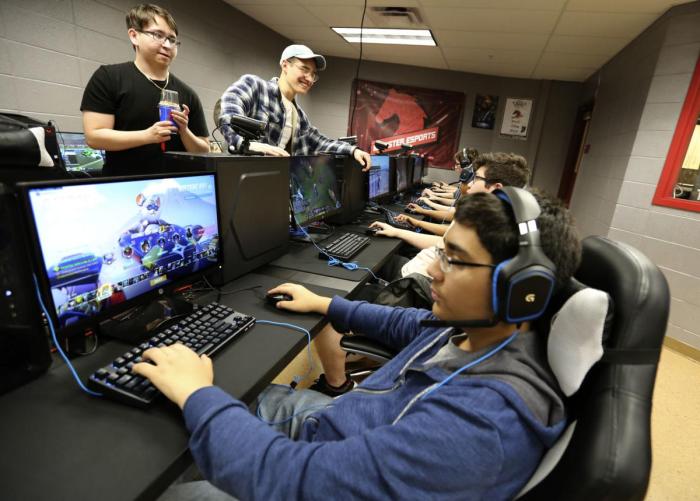Esports in education is more than just gaming; it’s a dynamic field transforming how we approach learning and skill development. This isn’t your grandpa’s arcade—we’re talking about leveraging the competitive spirit and intricate strategies of esports to enhance traditional academic subjects and cultivate valuable life skills. From designing engaging curricula to exploring lucrative career pathways, this exploration dives into the exciting intersection of gaming and education.
This paper examines how esports can be integrated into the curriculum, fostering teamwork, problem-solving, and critical thinking. We’ll explore the transferable skills gained through esports participation, the potential career paths within the industry, and the importance of creating inclusive and supportive esports environments in schools. Ultimately, we aim to showcase the potential of esports to not only engage students but also equip them with the skills needed to thrive in the 21st-century workforce.
Esports as a Curriculum Subject
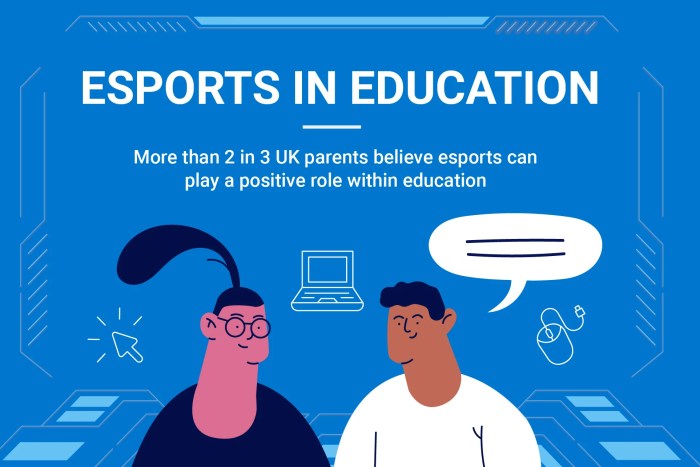
Integrating esports into the high school curriculum offers a unique opportunity to engage students in a rapidly growing industry while developing valuable life skills. This isn’t just about gaming; it’s about leveraging the competitive environment of esports to teach teamwork, strategic thinking, and digital literacy. A well-structured esports curriculum can complement traditional subjects and provide a pathway for future careers in the burgeoning esports ecosystem.
Sample Esports Curriculum: Introduction to Esports
This introductory high school esports course would cover fundamental aspects of competitive gaming, fostering both practical skills and theoretical understanding. The course would be designed to be flexible and adaptable to various game titles, allowing instructors to select games relevant to student interests while maintaining a consistent focus on core competencies.
Unit 1: Esports History and Culture This unit explores the evolution of esports, from early arcade competitions to the modern professional scene. Students will examine the business side of esports, including sponsorships, team management, and media coverage. They’ll also analyze the cultural impact of esports and its diverse community.
Unit 2: Game Mechanics and Strategy This unit focuses on the intricacies of a chosen game (e.g., League of Legends, Rocket League, Overwatch 2, Valorant). Students will learn core game mechanics, develop strategic thinking skills through gameplay analysis, and practice applying different strategies in simulated matches.
Unit 3: Teamwork and Communication This unit emphasizes the importance of collaboration and effective communication in team-based esports. Students will learn about roles within a team, develop communication strategies, and practice working together to achieve common goals. This will involve analyzing successful team dynamics and identifying strategies for conflict resolution.
Unit 4: Esports Technology and Production This unit delves into the technical aspects of esports, including game engines, streaming platforms, and broadcast production. Students will learn about different hardware and software used in esports and explore career pathways in esports production. This unit might involve hands-on experience with streaming software and basic video editing.
Integrating Esports into Existing Subjects
The competitive and analytical nature of esports lends itself to integration with various existing subjects. By applying esports principles and contexts, teachers can make learning more engaging and relevant for students.
Mathematics: Game mechanics often involve complex calculations and probability. For example, in strategy games like StarCraft II, students can apply mathematical concepts like optimization and probability to resource management and unit production. Analyzing game statistics and player performance data also offers opportunities to explore data analysis and statistical modeling.
Science: Esports can be used to illustrate scientific principles. For instance, understanding projectile motion in Rocket League or the physics of movement in first-person shooters can reinforce concepts learned in physics class. Game development itself involves principles of computer science and programming.
History: The history of esports can be used to explore broader historical themes. For example, analyzing the evolution of gaming consoles and the rise of online multiplayer can connect to technological advancements and social changes throughout history. The cultural impact of specific games can be linked to social and political events of their time.
Pedagogical Approaches: Traditional Subjects vs. Esports
Traditional subjects often rely on lectures, textbook readings, and assessments focused on memorization and recall. Esports education, however, necessitates a more hands-on, project-based approach. While theoretical knowledge is crucial, practical application and experience are paramount.
Traditional teaching often emphasizes individual learning, while esports naturally fosters collaborative learning through teamwork and communication. Assessment in esports might include analyzing gameplay footage, developing strategic plans, and participating in simulated tournaments, emphasizing critical thinking and problem-solving skills beyond simple recall.
Esports and Career Pathways
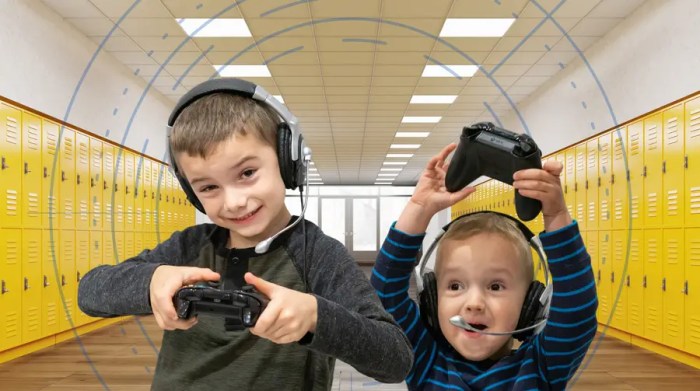
The esports industry is booming, offering a diverse range of career opportunities beyond professional gaming. For students interested in a future in this exciting field, understanding the available pathways and required skills is crucial for successful navigation of the job market. This section will explore several potential career paths, detailing the educational requirements and highlighting successful individuals who’ve paved the way.
Potential Career Paths in Esports
Many students might assume that esports is solely about playing games professionally. However, the reality is much broader. A wide variety of roles support the competitive gaming scene, offering unique challenges and rewards. The following list details some of the most in-demand careers within the esports industry.
- Professional Gamer: This is the most visible role, requiring exceptional gaming skills, strategic thinking, and the ability to perform under pressure. Extensive practice, team coordination, and a deep understanding of the game are essential.
- Esports Coach: Coaches analyze gameplay, strategize, and mentor players to improve their performance. They need strong game knowledge, leadership skills, and the ability to provide constructive feedback.
- Esports Analyst: Analysts break down gameplay, providing insights into player performance and team strategies. Strong analytical skills, data interpretation abilities, and excellent communication are crucial.
- Esports Commentator/Caster: Commentators provide real-time commentary during matches, keeping viewers engaged and informed. Excellent communication skills, a deep understanding of the game, and a captivating personality are necessary.
- Esports Manager: Managers handle the business side of esports teams, overseeing contracts, sponsorships, and team operations. Strong organizational skills, business acumen, and leadership qualities are essential.
- Esports Event Organizer: These professionals plan and execute esports tournaments and events, coordinating logistics, marketing, and sponsorships. Excellent organizational and project management skills are required.
- Esports Journalist/Writer: Journalists cover esports news, interviews, and features, requiring strong writing skills, an understanding of the industry, and the ability to meet deadlines.
- Esports Streamer/Content Creator: Streamers create and share engaging content online, building a following and often monetizing their streams through subscriptions and sponsorships. Strong communication skills, technical proficiency, and engaging personality are crucial.
- Game Developer/Designer (Esports Focus): Game developers and designers specializing in esports titles contribute directly to the competitive landscape, requiring strong programming and design skills, and an understanding of competitive balance.
Educational Requirements and Necessary Skills
The educational background needed varies greatly depending on the specific career path. While some roles, like professional gamers, may prioritize practical experience and natural talent, many others benefit significantly from formal education.
- Professional Gamer: While formal education isn’t strictly required, strong gaming skills honed through dedicated practice are essential. Many successful professional gamers supplement their practice with coaching and mentorship.
- Esports Coach/Analyst: A bachelor’s degree in sports science, data analytics, or a related field can be beneficial. Strong analytical skills, strategic thinking, and communication are vital.
- Esports Commentator/Caster: Experience in broadcasting or journalism can be advantageous. Excellent communication, quick thinking, and a passion for the game are key.
- Esports Manager/Event Organizer: A bachelor’s degree in business administration, sports management, or event management is often preferred. Strong organizational, leadership, and communication skills are crucial.
- Esports Journalist/Writer: A degree in journalism or communications is highly beneficial. Strong writing skills, knowledge of the esports industry, and the ability to meet deadlines are essential.
- Esports Streamer/Content Creator: While a degree isn’t always necessary, strong communication skills, technical proficiency, and an understanding of social media marketing are vital.
- Game Developer/Designer (Esports Focus): A degree in computer science, game design, or a related field is usually required. Strong programming, design, and problem-solving skills are essential.
Examples of Successful Transitions
Many individuals have successfully transitioned from competitive gaming to professional careers within the esports industry. For example, former professional players often become successful coaches or analysts, leveraging their in-depth game knowledge and experience. Others have used their platform and following to become successful streamers or content creators. Specific examples often remain confidential due to contractual obligations, but observing successful esports organizations reveals the career trajectories of many former players who have successfully transitioned into management or other support roles.
The Social and Emotional Aspects of Esports
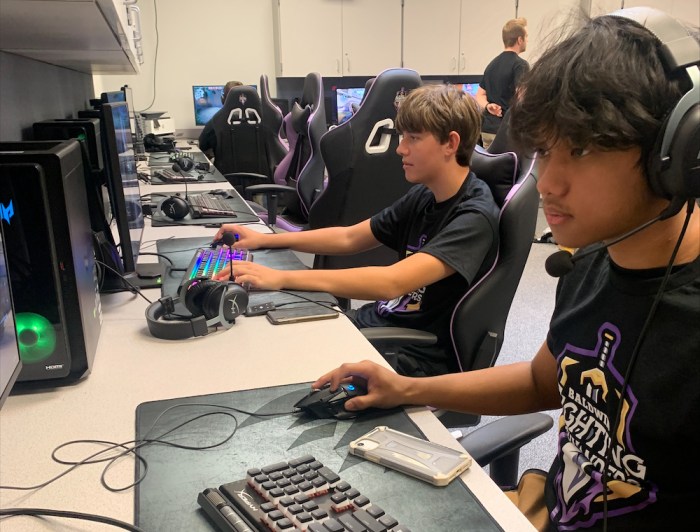
Esports participation, while offering exciting opportunities for skill development and competition, also presents a unique set of social and emotional challenges and benefits for students. Understanding these impacts is crucial for creating a supportive and enriching esports program within an educational setting. The highly competitive nature of esports, coupled with the online environment, can lead to both positive and negative outcomes, demanding careful consideration and proactive strategies.Esports participation can foster valuable social skills and emotional resilience.
Teamwork, communication, and strategic thinking are all integral to success, mirroring the benefits found in traditional team sports. However, the virtual nature of esports also introduces unique challenges, such as managing online interactions and dealing with the pressure of online competition.
Positive Social and Emotional Impacts of Esports
Positive social and emotional growth in esports often stems from collaborative team dynamics. Students learn to work together towards a common goal, relying on each other’s strengths and compensating for weaknesses. This collaborative effort fosters a sense of belonging and shared accomplishment, strengthening team cohesion and individual self-esteem. The intense focus required during gameplay can improve concentration and problem-solving skills, while the competitive aspect encourages perseverance and resilience in the face of setbacks.
Furthermore, successful esports participation can boost self-confidence and provide a sense of accomplishment, particularly for students who may not excel in traditional academic or athletic settings. For example, a student who struggles in a classroom setting might find their niche and build confidence within an esports team, positively impacting their overall self-perception.
Negative Social and Emotional Impacts of Esports
Conversely, the highly competitive environment of esports can also lead to negative social and emotional consequences. The pressure to perform, particularly in high-stakes tournaments, can result in stress, anxiety, and even burnout. Online interactions can sometimes be toxic, with instances of cyberbullying, harassment, and negative communication. The lack of face-to-face interaction can hinder the development of crucial social skills, and excessive gaming can lead to social isolation and neglect of other important aspects of life.
For instance, a student might prioritize gaming over schoolwork or social interactions, leading to academic difficulties and strained relationships with peers and family. The addictive nature of gaming can also be a concern, impacting sleep patterns, physical health, and mental well-being.
Strategies for Fostering a Positive and Inclusive Esports Environment
Creating a positive and inclusive esports environment requires a multi-faceted approach. Clear guidelines and codes of conduct are essential for establishing respectful online interactions and preventing cyberbullying. Educators and coaches should actively promote positive communication and sportsmanship, providing training and support to students on managing online interactions and dealing with conflict constructively. Regular team-building activities, both online and offline, can strengthen relationships and foster a sense of community.
Open communication channels between students, coaches, and parents are crucial for addressing concerns and providing support. Furthermore, incorporating mental health resources and promoting a balanced lifestyle, which includes time for academics, social activities, and physical exercise, is essential for preventing burnout and promoting overall well-being.
Comparison of Esports and Traditional Sports Team Dynamics
While esports teams share some similarities with traditional sports teams—such as the need for teamwork, strategy, and practice—there are also key differences in their social dynamics. The virtual nature of esports limits face-to-face interaction, potentially affecting team cohesion and the development of strong personal bonds. Communication relies heavily on online platforms, which can create challenges in building rapport and resolving conflicts.
Conversely, the anonymity offered by online interactions can sometimes embolden negative behavior, while the geographically dispersed nature of many esports teams can make it more challenging to build a strong team identity. However, successful esports teams often demonstrate strong communication skills, adaptability, and a high level of mutual respect, mirroring the positive dynamics seen in traditional sports teams.
The ability to overcome these unique challenges through effective communication and team-building strategies is key to fostering a positive and successful esports team.
Esports Infrastructure in Education
Building a successful esports program in a school requires careful planning and resource allocation. It’s not just about buying some gaming PCs; it’s about creating a supportive environment that fosters both competition and community. This involves strategic decisions regarding equipment, facilities, and budget, all while considering the long-term sustainability of the program.
Implementing an Esports Program: A Practical Plan
A well-structured plan is crucial for the successful implementation of a school esports program. This plan should Artikel the necessary equipment, facilities, and budget allocations. The following table provides a sample plan, adaptable to different school sizes and resources.
| Item | Description | Quantity | Estimated Cost (USD) |
|---|---|---|---|
| Gaming PCs | High-performance PCs with dedicated graphics cards, sufficient RAM, and fast processors. | 10 | $15,000 |
| Monitors | High-refresh-rate monitors (144Hz or higher) for optimal gaming experience. | 10 | $3,000 |
| Headsets | Noise-canceling headsets with clear audio for communication and immersion. | 10 | $1,000 |
| Networking Equipment | High-speed router and switches to ensure low-latency connections for online gameplay. | 1 | $500 |
| Gaming Peripherals | Mice, keyboards, and mousepads optimized for gaming. | 10 sets | $1,000 |
| Coaching Staff | Salaries for a coach and potentially assistant coaches. | 1-2 | $20,000 – $40,000 |
| Facility Rental/Renovation | Costs associated with securing a dedicated space for the esports program. | – | Variable (potentially $5,000 – $20,000+) |
| Software Licenses | Game licenses, communication platforms, and other necessary software. | – | $500 |
| Contingency Fund | To cover unexpected expenses or equipment repairs. | – | $1,000 |
| Total Estimated Cost | $46,000 – $66,000+ |
Note: These costs are estimates and can vary significantly depending on the specific equipment chosen and location.
Challenges and Opportunities in School Esports Programs
Creating and maintaining a successful school esports program presents both challenges and opportunities. Challenges include securing funding, finding qualified coaching staff, managing student participation, and ensuring fair competition. Opportunities include enhancing student engagement, developing valuable skills (teamwork, communication, strategic thinking), and providing potential career pathways. Successful programs often rely on strong community partnerships and creative fundraising strategies.
For example, schools might partner with local businesses for sponsorship or organize fundraising events to offset costs.
Ideal Esports Facility Design, Esports in education
An ideal school esports facility should be designed to maximize player comfort, performance, and team collaboration. The facility should include a dedicated space with sufficient room for gaming stations, comfortable seating, high-quality equipment, and excellent network connectivity. Additional features could include a dedicated coaching area, a viewing area for spectators, and potentially a streaming setup for broadcasting matches.
The environment should be well-lit, climate-controlled, and designed to minimize distractions, creating a professional and engaging atmosphere. Imagine a space with sound dampening to reduce noise, ergonomic chairs to prevent fatigue, and ample space for teams to strategize and debrief. The facility should also be easily accessible and adaptable to accommodate different game types and team sizes.
For instance, the space could feature modular furniture to allow for flexible configurations.
Esports and Inclusivity
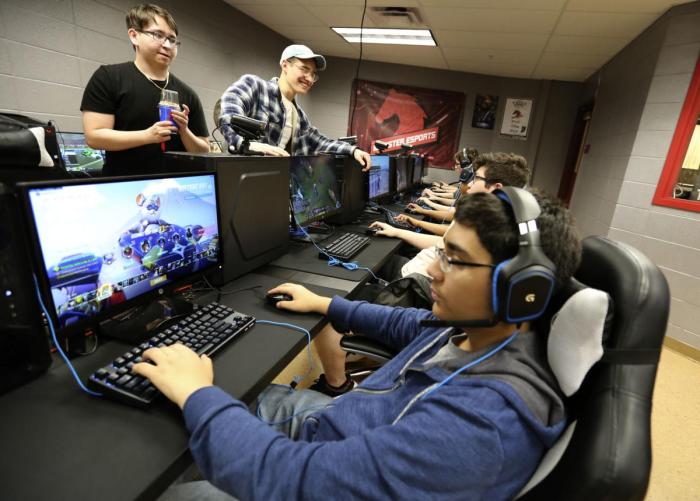
Creating equitable access to esports for all students is crucial for fostering a vibrant and representative community. Ignoring issues of inclusivity risks alienating significant portions of the student body and limiting the potential benefits of esports in education. This section will explore strategies to overcome barriers and build a truly welcoming esports environment.Esports, while seemingly accessible through its digital nature, presents unique barriers to participation for marginalized groups.
Socioeconomic factors, gender stereotypes, and accessibility challenges for students with disabilities all contribute to an uneven playing field. Addressing these issues requires a multi-pronged approach that considers both systemic changes and individual support.
Strategies for Equitable Access
Ensuring equitable access requires proactive measures. Schools need to offer scholarships or financial aid for equipment and entry fees to reduce the financial burden on low-income students. Providing access to high-speed internet and reliable computers is also essential, recognizing the digital divide that disproportionately affects marginalized communities. Furthermore, flexible scheduling and diverse game choices can accommodate the varied needs and interests of all students.
Finally, offering training and mentorship programs specifically targeted at underrepresented groups can build confidence and skills.
Potential Barriers to Participation
Several significant barriers can prevent marginalized groups from fully participating in esports. For example, the persistent gender gap in gaming and esports often stems from societal stereotypes and a lack of female role models within the community. This can manifest as online harassment or a lack of female-friendly environments. Similarly, socioeconomic disparities can limit access to high-quality equipment, internet connectivity, and coaching opportunities.
Students with disabilities may face challenges related to accessibility of equipment and game design, requiring adaptive technologies and inclusive game choices.
Creating an Inclusive Esports Community
Building a truly inclusive esports community requires a conscious effort to create a safe and welcoming space for everyone. This involves establishing clear anti-harassment and anti-discrimination policies and enforcing them consistently. Promoting positive social interaction through team-building activities and community events can foster a sense of belonging. Mentorship programs pairing experienced students with newcomers, particularly those from underrepresented groups, can provide invaluable support and guidance.
Regularly evaluating the inclusivity of the program and seeking feedback from students can identify areas for improvement and ensure the program remains responsive to the needs of all participants. Open communication and a zero-tolerance policy for discrimination are paramount.
FAQ Corner: Esports In Education
What equipment is needed to start a school esports program?
The essentials include high-performance gaming PCs, reliable internet connectivity, comfortable headsets, and a dedicated space for gaming. The specific needs depend on the chosen games and the number of students.
How can esports programs address concerns about excessive screen time?
Structured practice sessions, breaks, and emphasis on physical activity alongside esports participation can help mitigate the risks associated with excessive screen time. Educating students about healthy gaming habits is crucial.
Are there scholarships available for students pursuing esports-related careers?
Yes, several colleges and universities offer scholarships for students excelling in esports or pursuing degrees related to the gaming industry. It’s worth researching opportunities at various institutions.
How can schools ensure fair play and prevent cheating in esports competitions?
Implementing clear rules and regulations, utilizing anti-cheat software, and fostering a culture of sportsmanship are essential. Regular monitoring and transparent communication are key to maintaining fair play.
